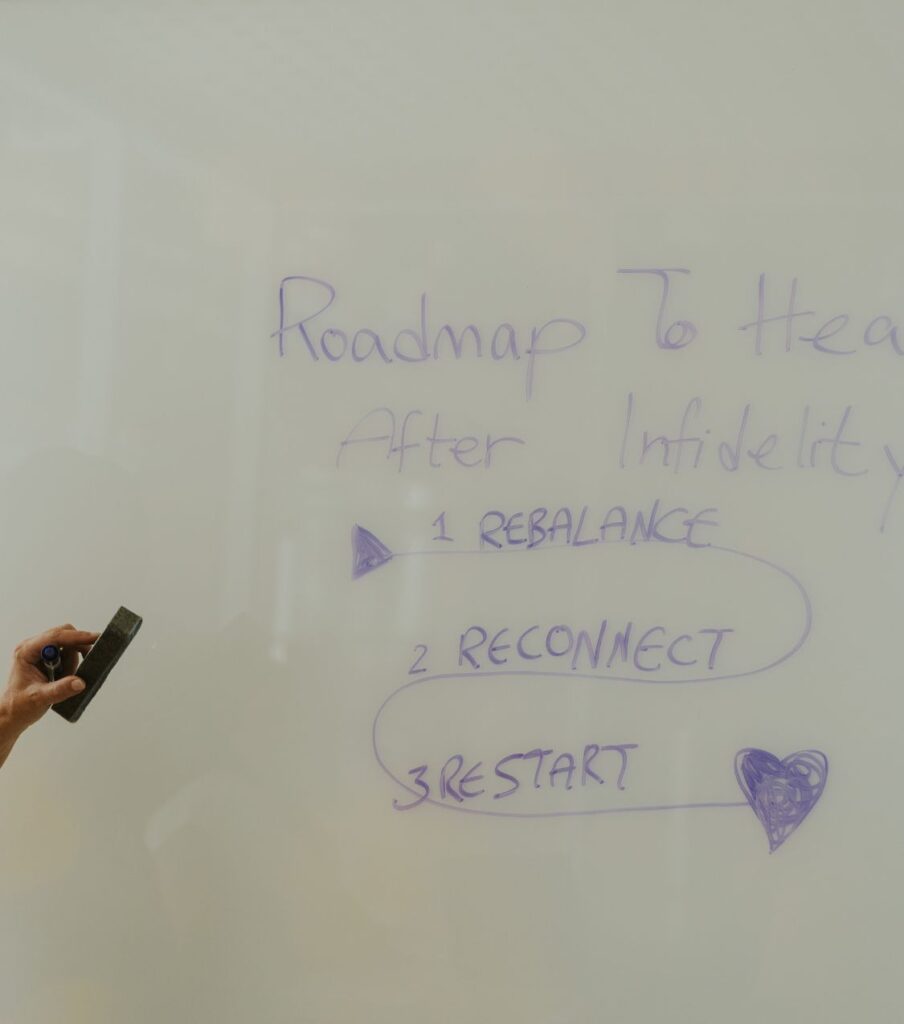Have you ever wondered why some couples can heal after infidelity, while others can’t? Infidelity is a deeply painful experience, and it’s a challenge that many couples face. In this guide, we’ll explore the process of affair recovery. I will show you how you can navigate this difficult journey.

Why Can’t Some Couples Heal From Infidelity
In my Facebook community, a member shared her heart-wrenching dilemma. She had been cheated on by her husband five years ago and decided to stay in the marriage. But, despite the passage of time, her pain seemed to be intensifying. She was now contemplating leaving her husband, a man she’d been married to for nineteen years, and with whom she had three children.
This scenario is not uncommon. Many individuals find themselves struggling with the aftermath of infidelity. Every week, couples in pain reach out, seeking guidance on how to heal from the wounds of betrayal. They share stories of infidelity that occurred just six months ago or revelations that date back twenty years. Regardless of the time that has passed and the decision to stay, one thing remains constant: the emotional pain. This pain within the marriage continues to fester. It often pushes one or both spouses to the brink of ending the relationship.
Why Time Alone Won’t Heal Your Marriage
So, what is preventing these couples from healing after infidelity? It turns out that several key factors play a pivotal role in the recovery process:
- Understanding the role of time
- The role of the unfaithful partner
- Infidelity is one aspect of the relationship
Key 1: Understanding the Role of Time in Affair Recovery
Time is not a magic healer when it comes to infidelity. Simply waiting for healing to occur isn’t an effective strategy. Instead, couples must actively engage in the healing process. Waiting for time to work its magic may exacerbate the pain and confusion, leading to emotional setbacks.
The Three Phases of Healing From Infidelity: Rebalancing, Reattachment, and Restarting
Affair recovery happens in three distinct phases: rebalancing, reattachment, and restarting. These phases are critical, and each plays a unique role in the journey toward healing.
Phase One: Rebalance

During this initial phase, the focus is on regaining a sense of balance. During the crisis triggered by infidelity emotions are tumultuous. They can range from love to hate, hope to despair, familiarity to alienation. Balancing these conflicting feelings is crucial for moving forward.
Ending the Affair:
One fundamental step in rebalancing is ensuring that the affair has genuinely come to an end. It’s not enough for the unfaithful partner to claim that the affair is over. The process of ending the affair must be responsible and meaningful for both spouses.
Rebuilding Trust:
Reestablishing trust, even at a minimal level, is vital during this phase. Full trust might not be achievable, but working towards a trust level of 80% is a reasonable goal. It will take time and ongoing efforts to get there.
Expressing Remorse:
A clear expression of remorse by the unfaithful partner is essential. A simple “I’m sorry” may not suffice, as expressing remorse involves more than meets the eye. You can read more on remorse expression after infidelity by clicking here.
Phase Two: Reattach

In the second phase, reattachment, the focus shifts to communication. Effective communication is vital for the healing process. There are tools couples can learn to transform their communication. We specifically use the Gottman Institute communication tools which are based on research.
It is important to facilitate healing conversations about pain and trauma to hear and heal the hurt partner’s pain. Then, it is essential to understand why the infidelity happened. Addressing the “whys” of infidelity is a key aspect of this phase because it helps trauma growth and prepares the couple for Phase Three.
Phase Three: Restart

In the final phase, Restart, couples close one chapter and begin anew together. New rules are established, intimacy is rekindled, and strategies are put in place to prevent relapse.
Rushing through the healing process without completing the previous phases is a common mistake. But, not planning for the future of the relationship can be detrimental. It can hinder successful reconciliation.
In this phase, the couple acknowledges their individual and mutual needs and boundaries. Then, they solidify it into a relationship agreement that represents their improved relationship.
Key 2: The Role of the Unfaithful Partner in Affair Recovery
The second crucial component of affair recovery is the willingness to take responsibility. The betraying partner needs to take responsibility for the wrongdoing and the healing process. Couples who succeed in healing from infidelity often have a betraying partner who understands and accepts a significant level of responsibility. This partner believes that healing should be a joint effort and is willing to take action to make it happen.
The Importance of Unfaithful Partners Taking Responsibility in Affair Recovery
My experience of over a decade working with couples in the aftermath of infidelity shows that unfaithful partners who take more responsibility for the healing process tend to fare better in the recovery journey. They are proactive in seeking therapy. They read books on healing or even enroll in programs to support the healing process. This commitment to shared healing is crucial in rebuilding the relationship.
The Dangers of Unfaithful Partners Shifting the Responsibility
On the flip side, when unfaithful partners avoid their responsibilities or push their betrayed partners to seek therapy alone, it can lead to unintended consequences. They may genuinely want to comfort their spouse by directing them toward therapy. Yet it often reflects a reluctance to address their role in the healing process. This attitude can further compound the crisis.
Key 3: Infidelity as One Aspect of the Relationship

The third component affecting recovery is the ability to view infidelity as one facet of a multifaceted relationship. This perspective doesn’t emerge immediately after the revelation of infidelity. Instead, it takes time and healing for couples to view the entirety of their relationship beyond the infidelity.
Seeing Beyond Infidelity
Couples who manage to overcome infidelity are those who can look beyond the affair and see the other aspects of their relationship. I’m specifically talking about situations where infidelity happens only once, not repeated cheating. If a person has cheated more than once, it’s incredibly difficult for their partner to see it as anything other than a defining part of the relationship. It completely breaks trust.
In cases where there has been a single instance of infidelity, I, as a therapist, observe how the hurt partner perceives the relationship:
- Are they able to see the good qualities in their partner?
- Can they recognize the positive aspects of their relationship?
- Are they capable of seeing beyond the feelings of mistrust and betrayal?
Unfortunately, some couples continue to focus solely on the affair, even months or years later. They might say things like, “I can’t trust anything they say,” or “I don’t know who they are anymore.” When this happens without proper therapy, the affair acts as a permanent barrier between partners. True healing becomes nearly impossible.
Living with the constant fear of more betrayal, lies, and secrets is incredibly challenging. The partner who cheated is always seen as “the cheater”. While the hurt partner remains stuck, always on edge, waiting for the next disappointment. This cycle of distrust makes it hard for the relationship to mend and move forward.
The Roadmap to Healing from Infidelity: How to Ensure You Follow These Phases

After exploring the essential components of affair recovery, let’s discuss how to ensure you go through all three phases of healing successfully.
1. Awareness Is Vital
Awareness is the first step towards healing. Understanding the healing roadmap provides direction and helps prevent overwhelm along the way. Whether you’re considering therapy or self-help, make sure you’re informed about the phases.
2. Choose the Right Expert and right Process
Selecting a therapist who specializes in affair recovery is crucial. Many therapists may not have expertise in this area but still accept infidelity cases. Ensure that your expert can guide you through the healing process. Make sure they can help you make the right choices for your relationship.
Another important component is having a roadmap to healing. Don’t settle for ongoing “venting sessions” that go nowhere. Make sure to work with an expert that offers a step-by-step structured program.
3. Self-Education Is Key
Educating yourself about healing after infidelity is invaluable. Self-help books, like “After the Affair” by Janis A. Spring, can provide insights into the healing stages. Podcasts are another resource to consider. Our podcast Relationships Uncomplicated offers tips to couples in the aftermath of infidelity.
Take the Next Step
These steps can help ensure that you and your partner are on the path to recovery.

- Learn more about our Affair Recovery Coaching Program.
- Schedule a free 45-minute consultation with our program specialist.
- Enroll and start healing and rebuilding trust immediately!
Listen to this Podcast Episode
MORE BLOGS ABOUT AFFAIR RECOVERY
Click here to read a recent blog post about affair recovery and the timeline of Affair Recovery
Comments +